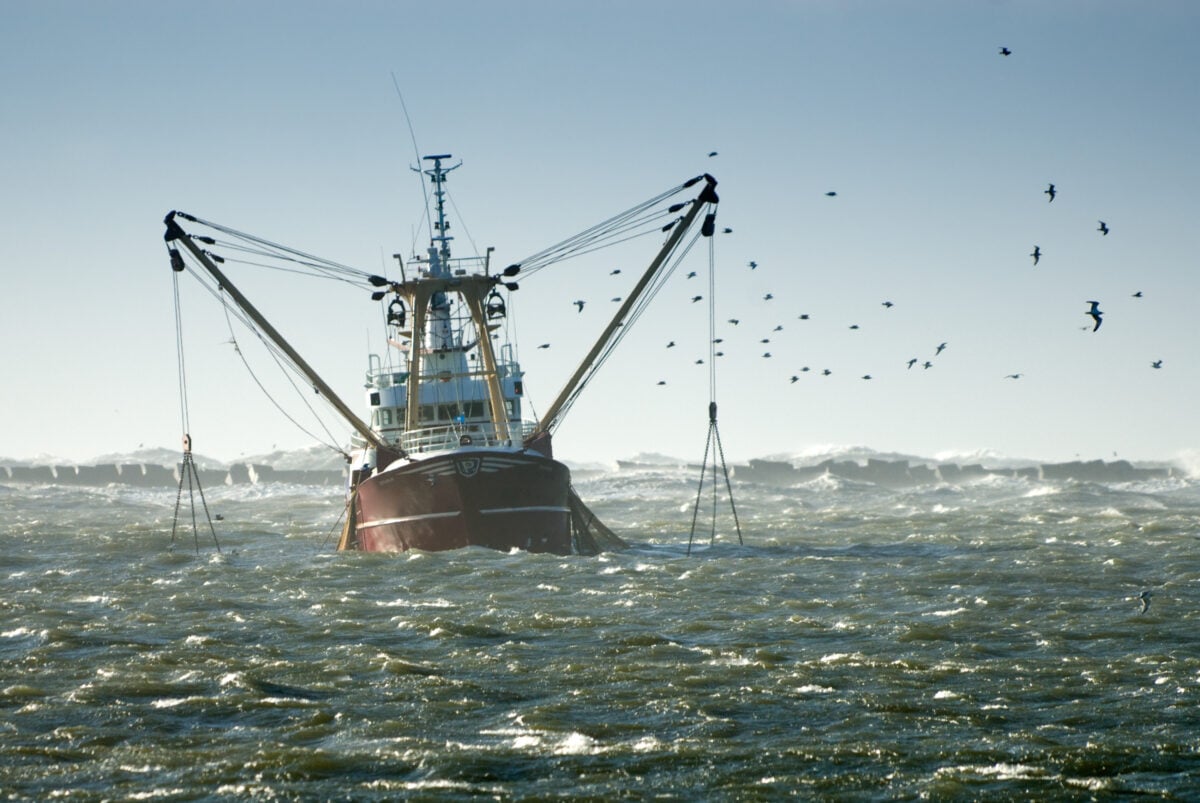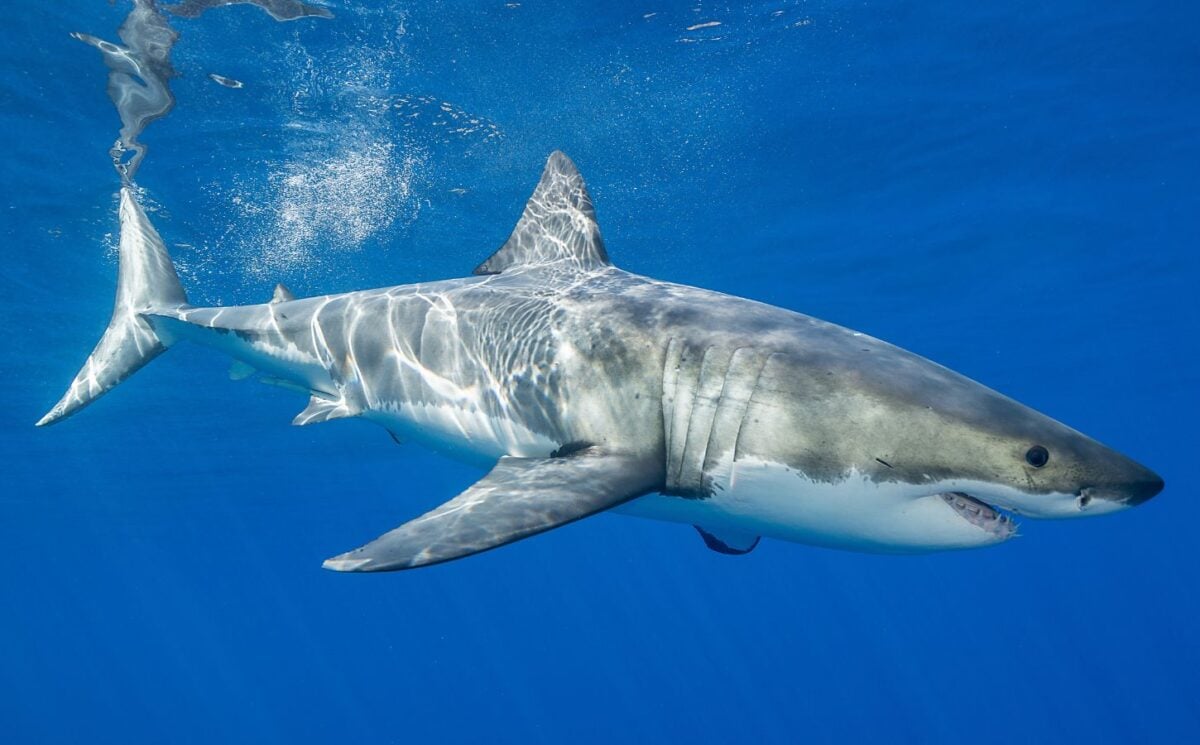Shark populations around the world have become increasingly vulnerable due to high levels of exploitation. A startling figure suggests that 100 million sharks are killed on a yearly basis. This estimate, although conservative, paints a grim picture of the intense pressure that shark species face largely due to human activities, such as commercial fishing and bycatch.
Read more: How Many Animals Are Killed For Food Everyday?
Sharks play a critical role in marine ecosystems, and their decline can have profound effects on the balance of marine habitats. They are also sentient beings capable of pain, fear, and suffering.
Various species of sharks are at risk, with some being caught for their fins, meat, oil, and other by-products. The extent of these practices shows that across the globe, shark populations are being diminished at rates that could threaten their survival.
Given that a significant percentage of sharks caught are already at conservation risk, it is crucial that sharks are offered more protections. Here, we detail what you need to know about sharks, and how they are treated throughout the world.
Shark Species and their global distribution
The global distribution of shark species is vast, with subsets of species adapted to a range of marine environments. Here, we evaluate the regions predominantly inhabited by various shark species and the expansive spectrum of these species.
Predominant Shark Habitats
Sharks have colonised nearly all marine environments across the globe.
Among the most widely distributed species, the oceanic whitetip shark, can typically be found in open waters, swimming in deep blue tropical and subtropical seas.
Hammerhead sharks, known for their distinctive head shape, frequent coastal warm waters, often in schools during the daytime.
Bull sharks, on the other hand, are unique in their ability to thrive in both saltwater and freshwater, commonly seen in coastal areas, rivers and lakes.
The whale shark, the gentle giant of the shark world, prefers warm waters. While they often roam the open seas, they congregate seasonally near coastal regions to feed.
Diversity of Shark Species

There are over 500 identified species of shark. They range from the small dwarf lantern shark, seldom seen by humans, to the aforementioned whale shark, the largest fish in the ocean.
Sharks are divided into eight orders, which help classify them based on common characteristics and evolutionary history. Here’s a brief overview of some of these orders:
- Carcharhiniformes: This order includes a majority of common shark species, such as the tiger shark and the bull shark.
- Squaliformes: These are deep-sea sharks, often with elongated bodies like the dogfishes.
- Lamniformes: In this order, we find the famous great white shark, and the basking shark, which is the second-largest fish in the ocean.
Each shark species plays a pivotal role in the marine environment, helping to maintain the health of the ocean’s ecosystems.
What sharks are endangered?
Of the approximately 500 species of shark, around 25 percent under threat, ranging from vulnerable to critically endangered. As apex predators, sharks play a vital role in the harmony of the ocean ecosystem. This is because they eat fish, creating a balance in the food chain. Their extinction can therefore lead to an increase in certain fish species, playing havoc on the health of our oceans. Critically endangered sharks include the daggernose shark, the ganges shark, the oceanic whitetip, and the scalloped hammerhead.
Threats to shark populations
Shark populations worldwide are under severe threat due to various human activities. Due to the fact they inhabit such a wide variety of ocean spaces, they are heavily impacted by many activities all over the world. Fishing, finning, and environmental changes are particularly detrimental, leading to a dramatic fall in numbers and raising the risk of extinction for many species.
Read more: Billions Of Animals Killed For Food End Up In The Bin, Says New Study
The problem of shark extinction is exacerbated by the fact that sharks are very slow in reproductive capabilities, meaning many are killed before they are able to have children. Their pregnancies can last for up to three years, they produce few offspring, and there are often large gaps between pregnancies.
Fishing and its impact
Sharks are actively fished out of the ocean due to the fact there’s a market for their meat and fins.
Fishing is the biggest threat to sharks worldwide. According to a study published in Nature, shark populations fell by 71 percent between 1970 and 2018.
Speaking about the findings, Professor Nick Dulvy, co-author of the study, said: “If we don’t do anything, it will be too late. It’s much worse than other animal populations we’ve been looking at. It’s an incredible rate of decline steeper than most elephant and rhino declines, and those animals are iconic in driving conservation efforts on land.”
As well as being sought out by fisheries, sharks are also victims to “bycatch,” which refers to unintended species being fished out of the ocean. It’s thought that around 50 million sharks are killed per year as a result of bycatch.
Sharks are often caught in fishing gear due to the fact that they feed on the fish being caught by humans. This means that they tend to be in the vicinity of fishing boats that use destructive practices like bottom trawling.
The practice of finning
Finning is the practice of removing a shark’s fins, often while the shark is still alive, and discarding the remainder of the animal at sea. This means that they suffer an agonizing death.
Read more: ‘Wrong On So Many Levels’: Scotland Urged To Crack Down On Salmon Farming
The fins are primarily used for making shark fin soup, a luxury dish in some cultures.
The global shark finning trade contributes significantly to the decline of shark populations, as it incentivizes the targeting of sharks for their fins alone.
Although countries like Brazil have stepped forward to regulate the trade, illegal fishing operations persist due to the lucrative nature of shark fins on the black market.
International trade regulations aim to curtail this practice by dictating sustainable fishing practices; however, enforcement varies greatly between regions.
Why else are sharks caught?
It’s important to note that shark finning is not the only reason sharks are sought by fisheries. It’s been commonplace to blame certain cultures for sharks being killed, but sharks are actually sought out for a whole host of reasons.
The shark oil and cartilage market is worth around USD $1 billion per year. Shark meat is also sold throughout the world, often to customers who have no idea what they’re eating.
According to a report published in January 2024, the crackdown on shark finning in some countries has incentivized the fishing industry to find alternative means by which to sell sharks. Shark finning legislation therefore has not led to a decrease in mortality. According to the report’s author, legislation had likely led to an increase in the number of sharks dying.
Researchers said that sharks are often caught and sold as “mystery meat,” and they may be found in countries all over the world, including in the UK. Study co-author Laurenne Schiller, a marine conservation scientist, told The Times: “Sharks are part of a global supply chain. There are countries all over the world that are consuming shark meat and sometimes not even knowing it.”
In 2019, DNA tests found that spiny dogfish – an endangered shark that cannot legally be caught in UK waters – was being sold in chip shops around the UK.
Another study found that shark meat was present in dog and cat food, also without being identified on the label.
Environmental changes
Sharks are also facing threats from changes in their environment. Pollution, the climate crisis, and habitat destruction can disrupt the fragile ecosystems where sharks play crucial roles.
These environmental changes can directly affect the availability of prey species and breeding grounds, resulting in further pressure on shark populations.
It is essential to understand that the cumulative impact of these threats can bring numerous shark species to the brink of extinction if unaddressed.
How many sharks are killed per year?

As mentioned previously, one estimate states that 100 million sharks are killed per year. It’s worth noting that this oft-cited number is from a 2013 study, and the current amount could well be much higher. Industrial fishing is always expanding, and illegal fishing activities also often go undocumented.
Human and shark interactions
In discussing human and shark interactions, it’s important to examine the prevalence of shark attacks, media influences on public perception of sharks, and the impact of human activities related to sharks.
The role of media in perception of sharks
Our understanding of sharks is often shaped by the media. Sensational reporting can amplify public fear, portraying sharks as relentless predators. Perhaps the most well-known portrayal of sharks in popular culture came in the form of the 1975 film Jaws. The iconic movie documented a bloodthirsty great white shark that terrorized a seaside town, killing multiple people in gory and bloody scenes. Since the film’s release, there have been numerous films showing sharks in a similar bloodthirsty manner. This is despite the fact that sharks very rarely actively hunt humans.
The negative portrayal of sharks means that the fate suffered by them by the hands of humans can often go overlooked, with people not caring how these “scary predators” are treated.
But this perception can overshadow factual representations and neglect the rarity of shark attacks.
Despite what the media would have you believe, there are actually relatively few shark attacks on humans each year. The number of these are miniscule compared to the number of sharks killed by humans.
Shark attacks statistics
According to the International Shark Attack File (ISAF), managed by the Florida Museum of Natural History, human encounters with sharks do occur but are relatively rare.
The data shows a yearly fluctuation in shark attack numbers across various regions including Australia, the USA (notably California and Florida), New Zealand, and the Bahamas.
For example, in 2020, there were recorded:
- Australia: 18 unprovoked shark attacks
- USA: 33 unprovoked shark attacks
- New Zealand: 1 unprovoked shark attack
- Bahamas: 2 unprovoked shark attacks
While a minority of these incidents result in fatalities, it is important to note that cases of unprovoked shark attacks leading to human deaths are exceedingly uncommon.
It’s thought that humans have a one in 3.7 million chance of being attacked by a shark. According to PETA, you are more likely to be killed by a champagne cork or fireworks.
The bottom line
Sharks have been on this earth for 400 million years (they were even here before dinosaurs), but humans are posing a huge threat to their continued existence. This is overwhelmingly due to demand for their meat and other byproducts, as well as demand for other fish meat.
While there are some initiatives in place to help protect sharks, these are increasingly proving themselves to be inadequate in the face of an out of control and often minimally regulated fishing industry. To protect sharks, the best thing that most humans can do is to stop eating fish, therefore minimizing their contribution to the destruction of our oceans and decimation of shark populations.






